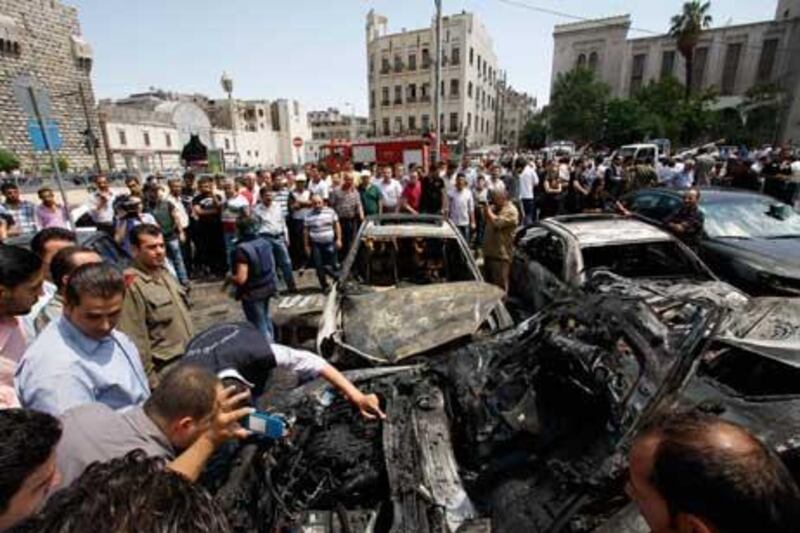Damascus // A normal Wednesday morning in the southern suburbs of Damascus; the air still cool from the night before, the birds singing, the shadows cast by the cedar trees still long on the ground.
A burst of automatic gunfire and the sound of an engine racing, then the quiet is restored. A few more shots, then silence once more.
"That was closer than normal, probably an assassination," says Abu Tariq, quickly returning his attention to the progress of his rooftop expansion project, under construction without a licence or the once customary bribe to the local building inspector because the authorities are worrying about other things these days.
He urgently needs the extra space now that relatives fleeing violence in north-eastern Damascus have come to stay - a temporary living arrangement that increasingly seems permanent enough to justify building extra rooms.
And he was right, it was an assassination. At 7am, a security officer was gunned down as he drove through Sahniaya, one of the few neighbourhoods considered safe on the Syrian capital's southern outskirts.
Peppered with bullet holes and the back window shot out, the wrecked white 1970s Peugeot 504 was left for a couple hours in the road, loosely guarded by plain clothes security agents - some surprisingly young, in tight jeans and T-shirts, pistols stuck in belts.
The car had come to a halt about 100 metres from the nearest police station and a similar distance from one of the local schools, where teenagers were turning up for exams.
Given the vast bloodshed and upheaval taking place elsewhere in the country, it was a small incident, not even reported in the local news.
But it was another indicator that the facade of calm that in-denial residents and officials have so resolutely thrown over Damascus and some of its suburbs is fracturing after 16 months of revolt.
Dramatic anti-regime protests and clashes between rebel fighters and government security forces inside the capital, particularly last month in Kafa Susa, have had a profound psychological effect.
"If you had told me a year ago that armed rebels in Damascus would openly be in the street protecting demonstrators and fighting against regime forces, I would never have believed it possible," said an Islamic cleric based in the Syrian capital.
"Now I have seen it with my own eyes, the impossible is happening," he said.
Less visible but also important are the numerous small signs that the struggle for Syria is now present in the very fabric of Damascus
A security outpost on the main autoroute into the city centre, close to a popular shopping mall, was recently abandoned because it was attacked too frequently and too successfully by the rebel Free Syrian Army - in an area where, just weeks before, it had no real presence.
At least one Baath party official, fearing he has been added to a rebel hit list, now drives his wife's small, nondescript car, not his own distinctive SUV, hoping to avoid the kind of assassination that caught up with the officer in the battered old Peugeot.
Out of similar fears, other government employees have changed their car registration plates, preferring anonymity to the previously coveted army-endorsed plate. Where once an association with the army incurred privileges, it has now become a liability.
Such efforts may be futile - after switching his number plate, one military official had a note left on his windscreen mocking the effort to hide. "Do you think we don't know who you are now?" it said.
Other regime figures who used to wander around town freely have now been assigned bodyguards and drivers.
In central Damascus too, there are signs that the authorities no longer believe their own oft-repeated assurances that victory is close at hand. Initially, temporary sandbag fighting emplacements were thrown up around official buildings, and makeshift concrete barriers dragged in for protection. Now, permanent steel and bulletproof glass cabins are starting to appear, and the hurriedly established barricades at security offices are being replaced by bigger, permanent fortifications.
One activist described the new conditions as an emerging, violent, system of accountability.
"The security services used to be able to do whatever they wanted with total impunity but now they know there is at least some price to be paid by them for their actions," he said.
Government forces "are still stronger than the opposition but a big change is that we used to be afraid and they were not. Now everyone knows some kind of fear."






